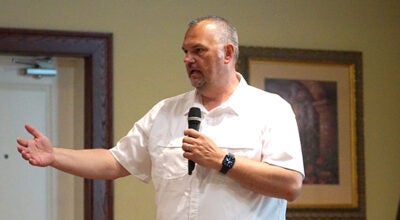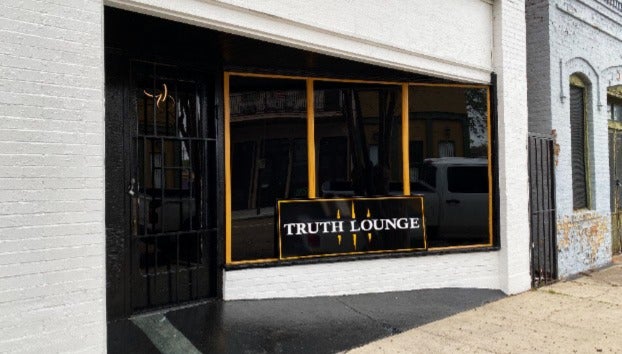SCRAPPY BUSINESS: Locals rely on junk, scrap metal for extra cash
Published 12:03 am Sunday, February 10, 2013

JAY SOWERS / THE NATCHEZ DEMOCRAT — Natchez resident Jim Sanders flips a used deep freezer onto his trailer while making his rounds through town on Thursday to collect old appliances that he will later take to the scrap yard.
NATCHEZ — The response Jim Sanders gives to people who want to pay him for picking up their junk always begins with a laugh.
“They’ll say what do I owe you and I just laugh and say, ‘You don’t owe me anything, you’ve given me something,’” Sanders said laughing while driving his pickup truck across the bridge into Vidalia. “They just gave me something that I’m going to turn around and make money off of, so why would I charge them anything?”
Sanders, a Natchez native who retired nine years ago from Fruit of the Loom plant in Vidalia, started collecting junk and various metal objects to be scrapped as a hobby five years ago.
While he was helping transport trash trailers to oil-well drilling sites in Columbia and Hattiesburg for a friend, Sanders said he began to see the business potential in collecting things that people were throwing away.
“I started seeing all this iron and other stuff around the areas they were working on and just started picking it up,” Sanders said. “I did that for about three years and then my name just kind of started getting out around town as someone who would help haul away junk.
“One thing led to another, and I just kept getting more and more calls.”
Sanders started small, picking up old washing machines, water heaters and whatever else people needed hauled away.
He also began driving around Natchez on trash pickup days to see what potential treasures were left on the sidewalk.
“I always stop to talk to the people and just make sure they’re OK with me taking whatever is out there,” Sanders said. “I try to be very honorable about everything because there are some interesting things people leave on the street that you wouldn’t think were supposed to be thrown away.”
And some of those things, Sanders said, don’t always get sent to the scrapyard.
“I found a stainless steel BBQ grill one time that had very little rust or anything on it,” Sanders said. “I cleaned it up real well, and it’s still the one I use today.
“You’d be surprised at some of the stuff you can find.”
The things that aren’t worthy of keeping get dumped into a large trailer hooked to the back of his pickup truck and hauled across the river to Concordia Metal Inc.

JAY SOWERS / THE NATCHEZ DEMOCRAT — Natchez resident Jim Sanders has been able to turn scraping into a profitable hobby. While it is not his main source of income, it does help him with many daily expenses.
An average week of collecting metal for Sanders can result in two trips to the scrapyard, but that all depends on the amount of stuff in his trailer.
Pulling into the scrapyard, Sanders first step is to drive onto a large scale that weighs the amount of material in his trailer.
After the employee controlling the scale gives Sanders a receipt, he pulls around to the back of the scrap yard and parks his truck under a large crane with a Magnetech magnet attached to the end.
The magnet picks up all the scrap metal in the trailer and moves it to a large pile of debris.
The weighing and magnetic pickup process is done in less than five minutes.
“Real quick and easy,” Sanders said climbing back into his pickup truck.
The next stop is in between the weighing station and the crane in a warehouse where copper wire is collected.
After another employee empties two large five-gallon buckets filled with copper wire, Sanders is handed a second receipt and heads to the cashier’s window for the final step.
“This is the best part right here,” Sanders said laughing.
For a trailer filled with two water heaters, fluorescent fixtures, a muffler and the copper wire, Sanders walks out of the scrapyard with $123.
“Not bad for a days work,” Sanders said.
For Sanders, scrapping the junk metal and other appliances is simply a hobby he said keeps him active, entertained and put some extra money in his pocket.
“It’s a lucrative hobby is really what it is,” Sanders said. “I’m not the kind of person who likes to sit still so this gets me out and about and meeting all kinds of people.
“I’ll keep doing this until the Lord calls me home.”
For other locals, like Henry Rutledge of Ridgecrest, scrapping iron and recycling wooden pallets is a full time job.
Rutledge, who has been scrapping iron for 15 years, said he first started after talking to another junk hauler who needed help.
“I started helping him just haul anything and everything we could find, and I kind of liked it,” Rutledge said. “You’re just always finding different things, and you really never know what you’re going to get one day to the next.”
While he does get the occasional call from people in the area wanting to get rid of a large appliance, Rutledge said the majority of his material is pulled out of a gulley or the river when the water levels drop.
“That’s the kind of stuff that you have to figure out a way to get it out or else you don’t get the money,” Rutledge said. “It’s hard sometimes, but you can make a good bit just hauling stuff you’ve found or people are throwing away.”
The more he got into the business, the more help Rutledge said he needed.
Luckily, his two sons, Henry Jr. and David, didn’t put up a fight to join their dad.
“I’ve been working with my dad since I was eight years old, so this was just something else we started doing together,” Rutledge said. “There’s nothing better than working with family.”
The Rutledge boys often take to the streets throughout Concordia and Catahoula parishes looking for whatever can be turned into money at the scrapyard.
The other side of the business is collecting the wooden pallets from stores around the Miss-Lou that Rutledge said have given him permission to haul away.
Those are loaded up every week and taken to Wisner, La., to be recycled for $3 a piece.
A shipment the Rutledge boys took last week contained 145 palettes, which were collected over the course of five days.
The work, Henry said, is something he enjoys doing because of the interesting things he encounters. It also doesn’t hurt to be able to be with his sons all day, he said.
“I have a daughter-in-law that’s getting even better than my two sons, though,” Henry said laughing. “She’ll get right in there with you and pick up anything.
“It’s hard work, but it’s honest work.”





